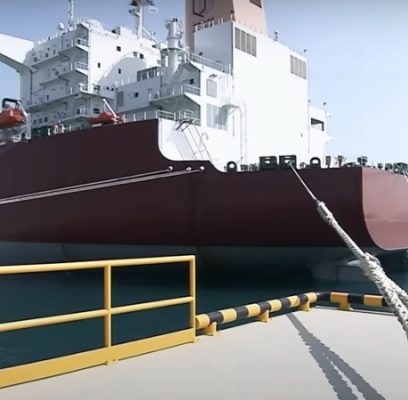Qatar is scheduled to sign more deals with energy firms for the nearly $30 billion project, which will cement its position as the world’s leader in liquefied natural gas production.
QatarEnergy has signed a partnership agreement with TotalEnergies to expand the North Field East of the world’s largest liquefied natural gas (LNG) project and said new partners will be announced in the coming days.
The Gulf state is working with international energy companies on the first and largest expansion phase of the nearly $30 billion North Field project.
Saad Al Kaabi, president of QatarEnergy as well as Qatar’s minister of state for energy, said the partner selection process is complete and further signings could be announced as early as next week.
He added that no company will have a bigger stake than TotalEnergies. TotalEnergies’ French CEO Patrick Pouyanne said the company would have 25 per cent of one line or liquefaction and refining unit in the project.
The Northfield expansion plan includes six LNG lines that will increase Qatar’s liquefaction capacity from 77 million tonnes a year to 126 million tonnes a year by 2027.
Major oil companies have applied for four lines to expand the North Field to the east and the other two lines are part of the second phase, the North Field to the south.
Al Kaabi said Qatar has a unified approach, with all four trains counting as one train. TotalEnergies owns a 25 per cent stake in one virtual train, giving it about 6.25 per cent of all four trains.
“We have announced that we are no longer investing in any new project in Russia, so it is important for us to sign this project in Qatar,” said Pouyanne.
LNG will go to Asia and Europe
Al Kaabi said that once the investment is completed, Asian buyers are expected to make up half of the market for the project, with the remaining buyers in Europe.
The project will strengthen Qatar’s position as the world’s largest LNG exporter and help guarantee long-term gas supplies to Europe as the continent seeks alternatives to Russian flows.
Leading oil and gas producers have sought a stake in the project, but Qatar’s strategy has been to raise the bar for what it expects from potential partners.
QatarEnergy has waited nearly five years to sign partnership agreements and has stressed that it has enough capital to finance the project on its own.
Total, Exxon, Shell, Eni and Chevron offered QatarEnergy the opportunity to invest in prize assets they own overseas.
The move has helped QatarEnergy grow into a major international player with stakes in petrochemical facilities and oil blocks around the world, from South Africa to Suriname.

